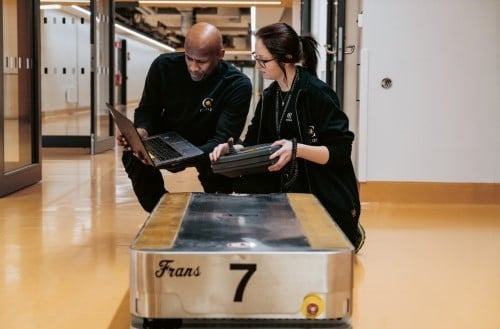5 fast-growing global trends that Coor is benefiting from
Facility management services are evolving rapidly and Coor works every day to stay up-to-date, to develop our service offers. Here are five trends that are shaping the industry: demand for sustainable deliveries, carbon footprint reporting, data-driven services, more robots in the workforce, and creating an overall experience for employees. Let’s take a closer look at each one.

1. Demand for sustainable deliveries
In property services, price is still an important factor, often in combination with a strong focus on security. A growing number of customers are demanding climate-friendly services, and those who fail to meet the requirements risk losing business. There is growing demand for circular services, such as subscribing to furniture. Zero waste – striving to generate as little waste as possible – is another way to make deliveries more sustainable. This may involve an increased degree of repair rather than replacement or using components with a longer service life, such as longer-lasting batteries.


3. Data-driven services
How often premises need to be cleaned varies over time. A flexible delivery model that can identify the actual need for cleaning is becoming increasingly popular. Data-driven cleaning relies on access to various types of information, for example through sensors which provide cleaners with continuous information about how many people are present in the customer’s premises and what the air quality is in each room. It may also involve identifying seasonal variations. The greater the number of integrated sources, the smarter the solutions we can offer to customers.


4. More and more robots in the workforce
Robots already handle many tasks at Coor. As the technology evolves and becomes cheaper, the range of tasks performed by robots will expand. Many actions that are currently performed by humans are still difficult to replace with robots, but technological advances are opening up new possibilities. Robots that can read analogue measuring instruments, for example, or detect leaks and identify unexpected temperature differences can be very useful in hazardous environments that are unsafe for humans.
5. Experience and well-being key priorities in tomorrow’s workplace
In the wake of the pandemic, many employers have struggled to lure enough of their employees back to the office. At the same time, most employers and employees agree that the physical workplace will continue to play an important role, not least in building corporate culture and enabling productivity and learning, at both the individual and team level. Employers need to create an overall experience where the physical environment, technology, people and services create an inspiring atmosphere, make life easier outside of work and enable employees to ensure their own well-being.

